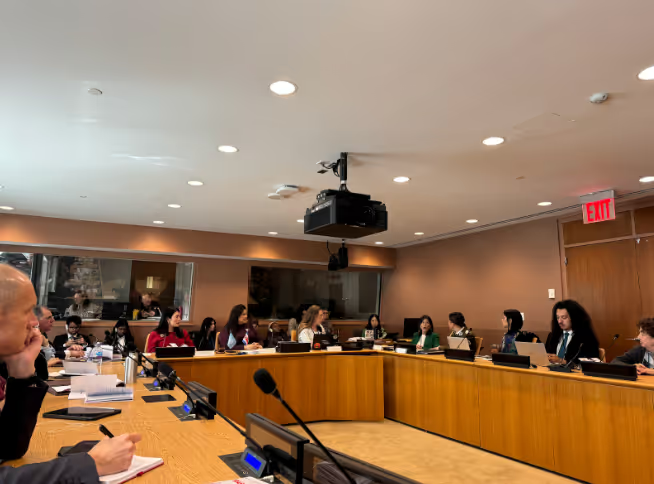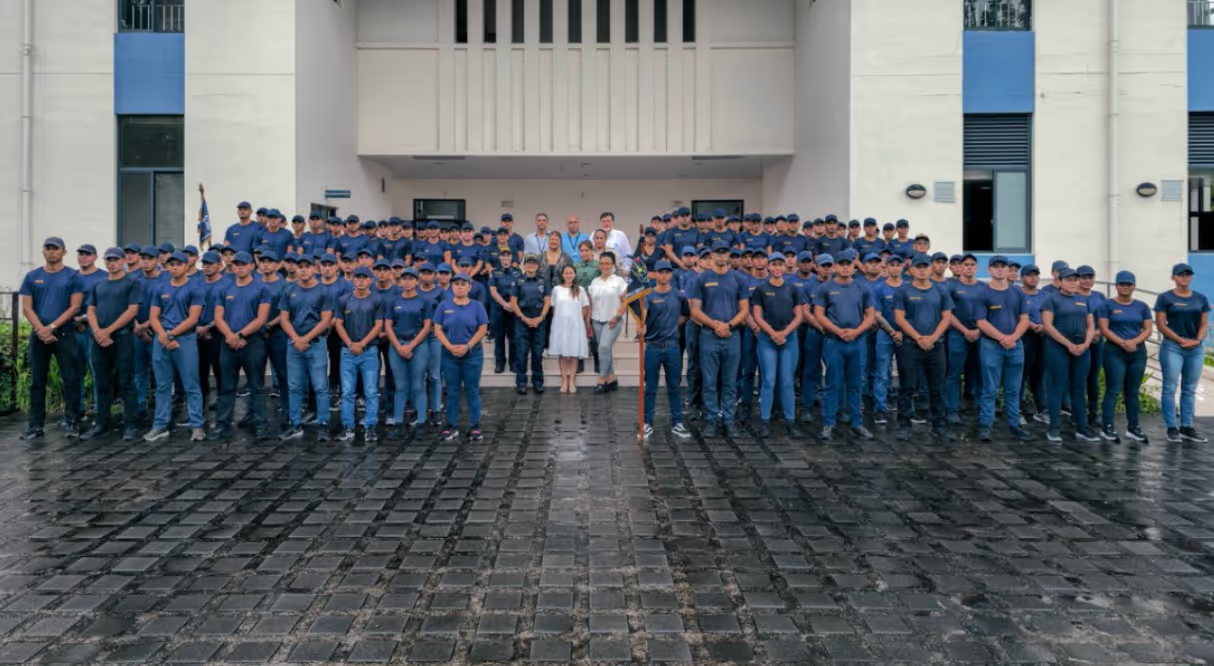Strengthening Gender Equality in Police Forces Costa Rica and The Carter Center at UN CSW69

May 1, 2025
From March 10 to March 25 2025, I had the pleasure of attending events at the sixty-ninth session of the Commission on the Status of Women for the first time. The events, some hosted at the United Nations Headquarters in New York, varied in topic, host and audience all with the general focus of advancing women’s rights. The two weeks I spent engaging with CSW were a fascinating sneak peek into the world of diplomacy. While many events discussed the Beijing Declaration and Platform for Action broadly, there was a common emphasis on increased implementation of the platform and renewed resources and commitment to its goals. A common theme, particularly expressed during the daily CSW NGO Briefings, was the barriers to attending CSW. CSW and most side events are hosted in person in New York City, with limited options for remote attendance, which creates many barriers for hopeful participants around the world and potentially excludes diverse perspectives.

I found the most impactful events were those that reflected on the Beijing Declaration and Platform for Action with specific and tangible goals and solutions, rather than discussing themes very generally. An event that was a highlight for me had a unique focus on gender equality in police forces, and was hosted on the sidelines of the sixty-ninth session of CSW by Costa Rica and the Carter Center. The event, ‘Strengthening Gender Equality in Police Forces: Experiences from Costa Rica’, included discussions with the Police Commissioner General Director of Law Enforcement from Costa Rica, the Manager of the Carter Center Costa Rica Project, the Police Advisor PM of Chile to the UN and the UN Women Representative in Ecuador.
In collaboration with Costa Rica’s Ministry of Public Security and the U.S Embassy’s International Narcotics and Law Enforcement Affairs Section, the Carter Center implemented a project to increase women’s participation in law enforcement. According to the Carter Center, “research has shown that inclusive policing can reduce police mistreatment of minority communities, with policewomen generally using less force than male counterparts. However, entrenched cultural and structural barriers have historically limited women’s participation and advancement in Costa Rica’s police forces.” The methodology of the project involved a structural approach to try to reach a framework for police forces in Costa Rica that includes a gender perspective. A new training course titled “Human Rights from a Gender Perspective in the Police Forces” was developed for the National Police Academy, and has become a graduation requirement moving forward for all officers. 21 officers were trained to be able to teach other officers and 121 male and female police recruits completed the new course. The project also created tools for these courses such as a manual on terminology from a gendered perspective, a normative framework to support the language and toolkits for discussions on gender in police stations.

The project also emphasized the importance of adapting current structures in law enforcement in order to retain female police officers and allow opportunities for career growth. It was noted by the Police Commissioner General Director of Law Enforcement in Costa Rica that women police officers are important to the police force as they may respond differently to men in certain situations. He also noted that to retain women police officers, certain structures had to be adapted in order to motivate and incentivize women. For example, women are unable to wear bulletproof vests after breastfeeding so breastfeeding women would be temporarily reassigned to comparable duties to allow them to do their job in a way that suits their needs and allows them to continue progressing in their career. Similar solutions exist in other contexts, such as in Chile where kindergartens are a part of law enforcement institutions to allow accessible childcare for women police officers, as well as an adapted code of work where women are able to have adjusted schedules that allow them to breastfeed their children while at work.
Women’s inclusion in law enforcement is incredibly important, and much can be learned from the Carter Center’s project in Costa Rica and from Chile’s efforts to include women. The goal of including and retaining female officers in law enforcement can be reached through efforts, such as:
- Specific “Human Rights from a Gender Perspective in the Police Forces” course for police recruits
- Instruction with a gendered perspective
- Toolkits to help police stations work towards gender equality
- Adapted uniforms and schedules for women
- Particular attention to the experiences of women officers
- Isabelle Regent, SecurityWomen Research Associate

May 1, 2025
Strengthening Gender Equality in Police Forces Costa Rica and The Carter Center at UN CSW69

May 1, 2025
From March 10 to March 25 2025, I had the pleasure of attending events at the sixty-ninth session of the Commission on the Status of Women for the first time. The events, some hosted at the United Nations Headquarters in New York, varied in topic, host and audience all with the general focus of advancing women’s rights. The two weeks I spent engaging with CSW were a fascinating sneak peek into the world of diplomacy. While many events discussed the Beijing Declaration and Platform for Action broadly, there was a common emphasis on increased implementation of the platform and renewed resources and commitment to its goals. A common theme, particularly expressed during the daily CSW NGO Briefings, was the barriers to attending CSW. CSW and most side events are hosted in person in New York City, with limited options for remote attendance, which creates many barriers for hopeful participants around the world and potentially excludes diverse perspectives.

I found the most impactful events were those that reflected on the Beijing Declaration and Platform for Action with specific and tangible goals and solutions, rather than discussing themes very generally. An event that was a highlight for me had a unique focus on gender equality in police forces, and was hosted on the sidelines of the sixty-ninth session of CSW by Costa Rica and the Carter Center. The event, ‘Strengthening Gender Equality in Police Forces: Experiences from Costa Rica’, included discussions with the Police Commissioner General Director of Law Enforcement from Costa Rica, the Manager of the Carter Center Costa Rica Project, the Police Advisor PM of Chile to the UN and the UN Women Representative in Ecuador.
In collaboration with Costa Rica’s Ministry of Public Security and the U.S Embassy’s International Narcotics and Law Enforcement Affairs Section, the Carter Center implemented a project to increase women’s participation in law enforcement. According to the Carter Center, “research has shown that inclusive policing can reduce police mistreatment of minority communities, with policewomen generally using less force than male counterparts. However, entrenched cultural and structural barriers have historically limited women’s participation and advancement in Costa Rica’s police forces.” The methodology of the project involved a structural approach to try to reach a framework for police forces in Costa Rica that includes a gender perspective. A new training course titled “Human Rights from a Gender Perspective in the Police Forces” was developed for the National Police Academy, and has become a graduation requirement moving forward for all officers. 21 officers were trained to be able to teach other officers and 121 male and female police recruits completed the new course. The project also created tools for these courses such as a manual on terminology from a gendered perspective, a normative framework to support the language and toolkits for discussions on gender in police stations.

The project also emphasized the importance of adapting current structures in law enforcement in order to retain female police officers and allow opportunities for career growth. It was noted by the Police Commissioner General Director of Law Enforcement in Costa Rica that women police officers are important to the police force as they may respond differently to men in certain situations. He also noted that to retain women police officers, certain structures had to be adapted in order to motivate and incentivize women. For example, women are unable to wear bulletproof vests after breastfeeding so breastfeeding women would be temporarily reassigned to comparable duties to allow them to do their job in a way that suits their needs and allows them to continue progressing in their career. Similar solutions exist in other contexts, such as in Chile where kindergartens are a part of law enforcement institutions to allow accessible childcare for women police officers, as well as an adapted code of work where women are able to have adjusted schedules that allow them to breastfeed their children while at work.
Women’s inclusion in law enforcement is incredibly important, and much can be learned from the Carter Center’s project in Costa Rica and from Chile’s efforts to include women. The goal of including and retaining female officers in law enforcement can be reached through efforts, such as:
- Specific “Human Rights from a Gender Perspective in the Police Forces” course for police recruits
- Instruction with a gendered perspective
- Toolkits to help police stations work towards gender equality
- Adapted uniforms and schedules for women
- Particular attention to the experiences of women officers
- Isabelle Regent, SecurityWomen Research Associate




